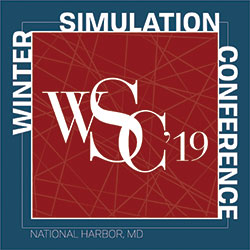Winter Simulation Conference 2019
Simulation for Risk Management
December 8-11
Gaylord National Resort & Conference Center
National Harbor, Maryland
WSC 2019 will focus on the use of simulation to address a wide range of individual and societal risks.
From its very beginnings over 70 years ago, simulation has been a powerful tool for assessing potential risks and guiding us in making decisions under uncertainty. The 2019 conference seeks to highlight the latest simulation technologies for more accurately anticipating risks and for making more robust decisions in the face of uncertainty, ambiguity, and variability. These include methods for robust and accurate simulation modeling, analysis, and optimization. We also invite papers describing applications of simulation to risk management in a broad variety of domains, including healthcare, disaster response, power grids, construction, transportation, finance, cybersecurity, and more.
2019 KEYNOTE SPEAKER
Dr. Robert Atlas
Director Emeritus, National Oceanic and Atmospheric Administration (NOAA) Atlantic Meteorological Laboratory
Modeling and Simulation for Reducing the Risks Associated with Extreme Weather
The reduction of losses related to hurricanes and other extreme weather phenomena involves many complex aspects ranging from purely theoretical, observational, computational and numerical, to operational and decisional. A correct warning can lead to proper evacuation and damage mitigation, and produce immense benefits. However, over-warning can lead to substantial unnecessary costs, a reduction of confidence in warnings, and a lack of appropriate response. In this chain of information, the role played by scientific research is crucial. The National Oceanic and Atmospheric Administration (NOAA), in combination with the National Aeronautics and Space Administration (NASA), other agencies, and universities is contributing to these efforts through observational and theoretical research to better understand the processes associated with extreme weather. This includes model and data assimilation development, Observing System Experiments (OSE), and Observing System Simulation Experiments (OSSE) designed to ascertain the value of existing observing systems and the potential of new observing systems to improve weather prediction and theoretical understanding. We describe innovative research for developing advanced next-generation global and regional models to improve weather prediction, and the application of OSSEs to optimize the observing system.
TITANS OF SIMULATION
Dr. Peter Glynn
Thomas Ford Professor, Stanford University
Dr. Margaret Loper
Chief Scientist, Georgia Tech Information & Communications Laboratory
PROGRAM
WSC 2019 will feature a comprehensive program ranging from introductory tutorials to state-of-the-art research and practice. Planned tracks are:
- Advanced Tutorials
- Agent-Based Simulation
- Analysis Methodology
- Aviation Modeling and Analysis
- Big Data in Simulation
- Case Studies
- Complex, Intelligent, Adaptive and Autonomous Systems (CIAAS)
- Cybersecurity
- Environment Sustainability and Risk
- Financial Risk Management
- Gaming
- Healthcare
- Hybrid Simulation
- Introductory Tutorials
- Logistic, Supply Chains, Transportation
- Agent-Based Simulation
- Modeling and Analysis of Semiconductor Manufacturing (MASM)
- Manufacturing Applications
- Military Applications
- Modeling Methodology
- Networks and Communications
- PhD Colloquium
- Poster Session
- Project Management and Construction
- Risk Analysis
- Safety Applications
- Scientific Applications
- Simulation Education
- Simulation Optimization
- Uncertainty Quantification and Robust Simulation
- Vendor
WSC 2019 is sponsored by ACM/SIGSIM, ASA (Technical Co-Sponsor), ASIM (Technical Co-Sponsor), IEEE/SMC (Technical Co-Sponsor), IISE, INFORMS-SIM, NIST (Technical Co-Sponsor), SCS, and ORS (UK, Technical Sponsor).
